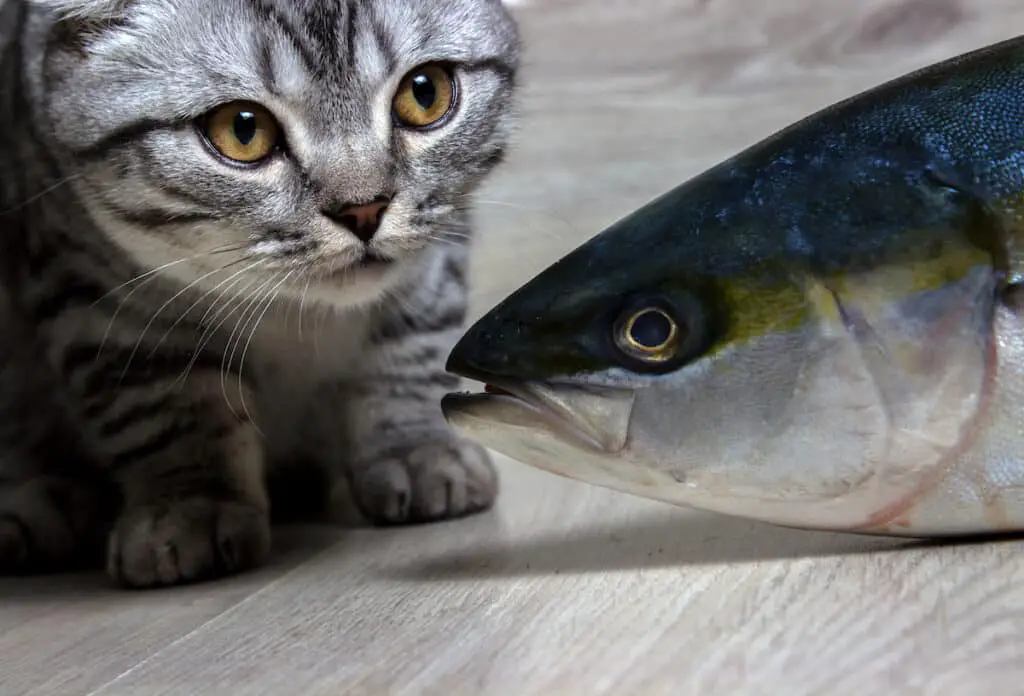As much as your feline friend loves fish, and tuna in particular, you might be wondering if it’s safe for them to eat this type of seafood. The good news is that cats can eat tuna. However, we wouldn’t recommend feeding tuna to your cat every day because too much of anything isn’t good!
Is Tuna Good or Bad for Cats?
Tuna is an excellent source of protein and nutrients, including vitamin B12, omega-3 fatty acids, and vitamin D. These vitamins and minerals are essential for maintaining healthy blood cells and nerves, a strong cardiovascular system, bones, and muscles.
Though tuna has many nutritional benefits for humans, feeding it to your cat too often can lead to some health problems.
Feeding your cat too much tuna can lead to weight gain. Tuna is a healthy food for us humans, but because cats are smaller than us, those calories have more of an impact on their weight—literally. And though chonky kitties are absolutely adorable, excess weight can result in chronic inflammation, heart disease, diabetes, and cancer.
By following the 10 percent rule with snacks and treats for our cats (meaning: only giving them 10% of their daily caloric intake in snacks), we can help keep our beloved felines at a healthy weight so they live a longer life.
The Merck Veterinary Manual highlights that fish is a top allergen for cats–so much so that it’s the first food listed under allergies.
Signs of food allergies in cats include:
- Small, crusty bumps
- Hair loss
- Redness
- Itching
- Vomiting
Tuna And Mercury Poisoning
In addition, mercury poisoning is a worry. Mercury is a poisonous metal located in water, air and soil. All fish have mercury to some degree; however, tuna has elevated levels as compared to different kinds of fish. If cats or humans consume too much tuna regularly over an extended time period, they can get mercury poisoning.
Signs of mercury poisoning in cats include:
- Loss of coordination
- Unsteady gait
- Abnormal behavior
- Tremors or seizures
- Involuntary body and eye movements
- Central nervous system depression
- Vision loss
- Death
It’s important to note that, although still present, mercury poisoning cases have declined in recent years.
Can Cats Eat Tuna Sometimes?
Cats can eat tuna, but it should only be in moderation. Tuna is best used to flavor food or for a cat who isn’t eating as much as usual.
Many cats love the taste of tuna, but it’s important to be aware of the different types and their nutrient levels—as well as mercury content. Straight tuna is high in unsaturated fats and does not have antioxidants, such as vitamin E, which can lead to health problems. Tuna, especially albacore variety, can also be high in mercury. (For this reason, it’s not recommended as a daily meal for people either.) As with any protein food, there is always potential for allergic reactions too.
You should cook tuna before giving it to your cat, similar to how you would prepare salmon. Safe eating!
How Much Tuna Can I Feed My Cat?
Our cats love tuna and would theoretically eat it constantly if we let them. However, we are mindful that too much tuna is not good for their health and police their consumption accordingly. The old adage “everything in moderation” rings true here.
Adding some juice from tuna canned in water to your cat’s water bowl every now and then may encourage drinking—always beneficial. Tuna flavored cat foods are common among many felines (be sure the label says complete and balanced.) The takeaway: don’t consider tuna a meal for your kitty. Instead, it can be an occasional treat or flavoring/ ingredient in a nutritious food.














